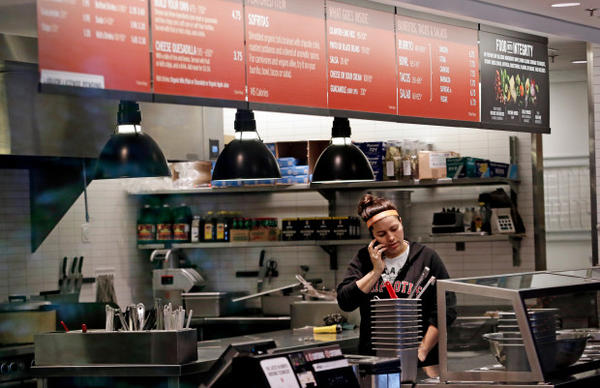E. Coli Outbreak
Shows Vulnerabilities Of Big Chains Using Local Food
By CONRAD WILSON • 21
HOURS AGO

A woman talks on the phone as she stands in
the kitchen area of a closed Chipotle restaurant, Monday, Nov. 2, 2015, in
Seattle. An E. coli outbreak linked to Chipotle restaurants in Washington state
and Oregon has sickened several dozen people in the third outbreak of foodborne
illness at the popular chain this year.
ELAINE THOMPSON
Originally
published on November 5, 2015 8:13 pm
Heath
officials in Washington and Oregon are in the midst of an investigation into
the source of E. coli linked to Chipotle restaurants.
So
far, they don’t know which foods sickened some 40 people, a dozen of
whom were hospitalized.
While
investigators suspect some kind of uncooked produce, officials don’t know if
they’ll ever find the source of the bacteria.
They’re
looking at things like tomatoes, lettuce, cilantro or some other kind of
uncooked food, said Dr. Kathleen Gensheimer, chief medical officer for foods
and veterinary medicine at the FDA.
“We
don’t necessarily go after each and every food item that the facility
serves," she said. "We are targeted in those efforts by the
information our public health partners obtain."
In
addition to testing things such as salsa and guacamole, Gensheimer said
investigators use records to figure out the source of the foods that Chipotle
served. That helps identify where along the supply chain the food became
contaminated, she said.
“We’re
not always that successful to be quite honest," Gensheimer said.
"From cilantro, to tomatoes and peppers and onions, it can be very
challenging to really tease out what specific item – if it was the salsa, for
instance – may have been contaminated and contributed to illness.”
Outbreaks
of food-borne illness that span multiple states have increased in recent years.
The
Centers for Disease Control and Prevention released a report this week that
found since 2010, there have been an average of 24 multi-state outbreaks of
food-borne illness every year.
That’s
more than three times the number of cases during the 1990s, according to the
CDC.
“We
are seeing these outbreaks more frequently, but we think a lot of that is due
to the fact that we have better methods to detect these outbreaks," said
Matthew Weiss, who runs a team at the CDC that investigates bacterial outbreaks
in food and water.
Despite
the increased frequency and the current outbreak of E. coli related to
Chipotle, food safety experts say the supply chain from farm to table is safe.
“These
kinds of incidents concern all of us and we want to find out what happened, and
how to avoid it in the future," said Stephanie Page, program director for
food safety and animal health at the Oregon Department of Agriculture.
In
some cases, it’s difficult to know how safe produce is because it’s imported,
she said.
“We
don’t necessarily know under what kinds of conditions it was grown," Page
said. "Having said that, most retailers that buy a lot of produce
internationally require their suppliers to follow food safety standards.”
Domestically,
Page said most farmers follow voluntary safety programs required by restaurants
and grocery stores if they want to sell their products there. Some of those
rules will soon become federal law.
At
the farm level, employees, dirty irrigation water or even wildlife can
contaminate food. At the packing house, pest control is a priority.
Larry
Lev, an extension economist with Oregon State University, said Chipotle’s
commitment to serving local foods when possible make the chain more susceptible
to things like E. coli outbreaks.
“There’s
the potential to have somewhat greater events that are smaller in size, with a
more localized food supply chain — just because there are more warehouses, more
places, more farms that are involved," Lev said.
“The
tradeoff is if you go to a more national supply chain, if you have this kind of
event it will be more broadly distributed. It may be more difficult to get back
to the source," Lev said.
Though
it could take awhile, health officials said they’d like to find the source of
the E. coli before Chipotle reopens its restaurants around the region.
No comments:
Post a Comment